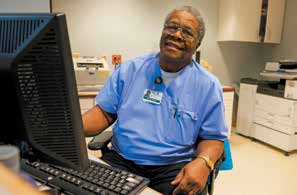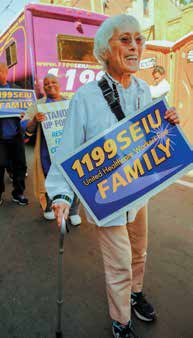March on Washington Was Led By Labor Unions
September 5, 2023

1199 leaders have been raising the banner of social justice since the union’s inception. They’ve never failed to emphasize the enduring connection between economic rights and civil rights. One of 1199’s earliest campaigns in 1930s New York City demanded the hiring of Black pharmacists and the promotion of Black porters to “soda men” – the job of dispensing egg creams and other soda-based drinks in the old pharmacies.
In 1963, the Union named its collective bargaining campaign “Operation First Class Citizenship,”
similar to the March on Washington’s demand for “full citizenship.” The March – which was the Union’s first appearance onto the national stage—played an important role in committing 1199ers to the ongoing struggle for economic and social justice.
An army of 1,000 members boarded a New York City train to D.C. in the wee hours of Aug. 28. Members donned blue and white 1199 paper caps as they then made their way from the Washington Monument to the Lincoln Memorial. One of their banners read: “America’s Fastest Growing Union Marches for Jobs and Freedom Now.”
The leaders of the March were close friends of 1199. A. Philip Randolph, the March’s director, was a legendary labor and civil rights champion. The renowned organizer Bayard Rustin served as Randolph’s chief lieutenant. From 1959 to 1962, the two also led the public-support campaign of 1199’s hospital organizing drive.
Many other leaders at the March had either already appeared at 1199 events, or would soon do so. Among them were Harry Belafonte (who later headed the Bread and Roses project) – Sidney Poitier, Ossie Davis, Ruby Dee, James Baldwin, Pete Seeger, Mahalia Jackson, Joan Baez, and Coretta Scott-King (who would become the honorary chair of 1199’s national organizing campaign).
Most of the 1199ers who attended the March on Washington have since passed away—but one current member named Bill Pigford, a unit specialist at Prince George’s Hospital in Cheverly, MD, remembers being there. Pigford organized buses from Mississippi while working with the Congress of Racial Equality (CORE) and the Student Non-Violent Coordinating Committee (SNCC)—two of the March on Washington’s major organizers.
Not long after the March, Pigford spent 30 days in Mississippi’s Laurel County Jail for taking part in a desegregation sit-in at a lunch counter in Laurel’s Pinehurst Hotel. He later served as a combat medic in Vietnam, retiring as an Army master sergeant in 1996. Pigford has worked at Prince George’s Hospital for more than a quarter of a century.

Pigford’s trade unionism and civil rights work have taught him the urgency of solidarity. “We need to trust one another,” he says. “There is no ‘you’ without ‘me.’”
1199ers have kept Dr. King’s dream alive since 1963. Ten years ago, during observances of the March on Washington’s 50th anniversary, the late 1199 retiree Monnie Callan was interviewed about her participation in the seminal event. “I grew up in a family where I was raised to stand up for basic rights,” she said. “It’s in my blood. And that’s why I attended the original march in ’63 with my husband and two young children.”
Lyndie Callan was just three when parents Monnie and 
The same spirit also remains a powerful force in retiree Eve Sverdlove’s life. “My parents were activists and were involved in all progressive causes,” she says. “My dad was a labor leader. I was 9-years-old when they attended the March on Washington. In 1968, when I was 14, I traveled with them to Washington (D.C.) for the Poor Peoples March. As a result of my upbringing, I’ve always wanted to help people in need. I chose healthcare as a profession and organized my co-workers to become members of 1199SEIU. I’m retired now, but the struggles continue. Remembering and honoring my dad, I say, ‘We must never give up the good fight.’”

